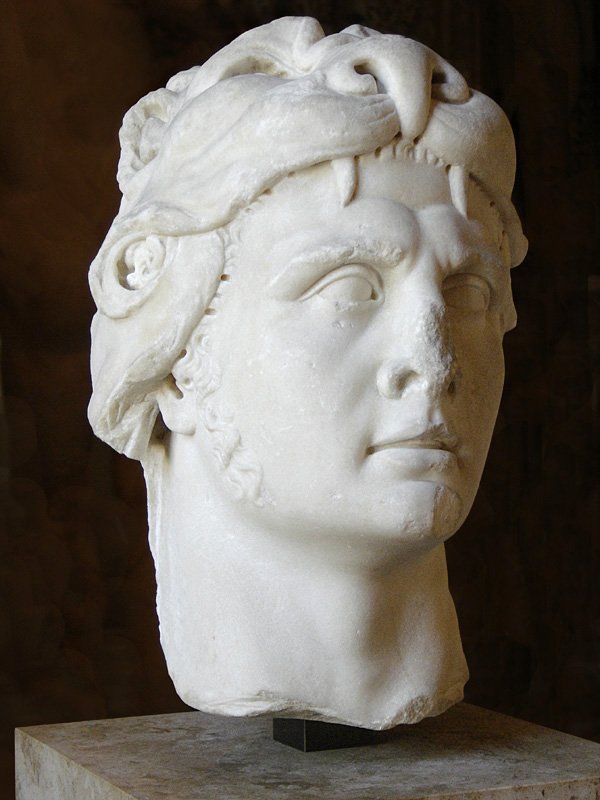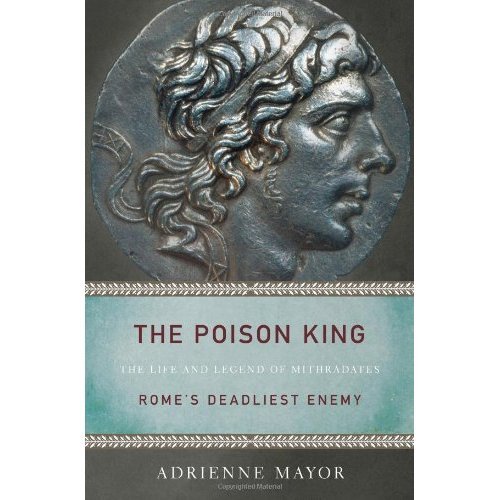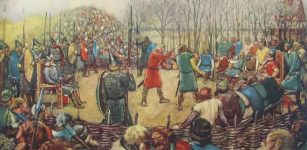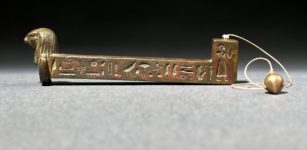King Mithradates VI Of Pontus Used Poison To Avoid Death By Poison
MessageToEagle.com – Mithradates VI Of Pontus (120-63 BCE), often referred to as the Poison King was a brilliant toxicologist. He was obsessed with poison and took small doses of a specially prepared poison to help him develop a resistance if some should try to poison him.
Living in times when slipping poison into food or drink was a reality that had been one of the choice methods of assassination for thousands of years, King Mithradates VI began a rigid program to educate himself on every form of poison and that knowledge would later become his greatest enemy.
King Mithradates VI Of Pontus was a descent from Alexander the Great and Darius of Persia. He was a powerful king who hated Rome and challenged the late Republican Rome, creating an empire that stretched from the northern reaches of the Black Sea to Syria and Armenia. While loathed by Rome for his massacre of 80,000 Roman civilians in 88 BCE, Mithradates was hailed by Greeks and Persians as a “savior” from oppressive Roman misrule. Rome’s Rome’s most relentless rival became feared as “the Hannibal of the East”

In time, Mithridates would take the title, “the Great” or Megas and would also be known as Eupator Dionysius. The title, “Eupator” means, “born of a noble father” and his connection to the god of wine and revelry, Dionysius (Bacchus-Roman), is evident.
King Mithradates VI had a good reason to become obsessed with poison. The previous ruler and king, Mithridates V, had been assassinated by poison at a banquet in 120 B.C. in the city of Sinope, the same place where Mithridates VI was born.
Now, of course, King Mithradates VI who had plenty of enemies feared he might one day succumb to a similar fate.
See also:
Medieval Rich People Unknowingly Poisoned Themselves With Lead And Other Hazardous Heavy Metals
Bizarre Old Ring With License To Kill
In order to learn the secrets of poisons, King Mithradates VI started to mix different herbs together. He developed lethal poisons and then took small, self-administered, non-lethal doses to ensure that his immune system would be able to survive. He studied everything he could get his hands on, and consulted some of his most trusted advisers. Such was his desire to avoid death by poison, that it became a serious fear of his in an attempt to make sure he was immune to every type and consistency of poison.
In our present day, this practice has become known as, Mithridatism which is a system that is practiced in parts of the world and in unique fields, such as snake handlers or people who work with poisons of a special nature.
Mithradates’ wars against Rome lasted four decades, engulfing three continents.
In the end, Rome was victorious and King Mithradates VI lost his kingdom and his life, but the pushed the Roman Republic, already reeling from slave revolts and domestic violence, over the brink into self-destruction and forced reinvention.
Machiavelli praised his military genius. European royalty sought out his secret elixir against poison. His life inspired Mozart’s first opera, while for centuries poets and playwrights recited bloody, romantic tales of his victories, defeats, intrigues, concubines, and mysterious death. But until now no modern historian has recounted the full story of Mithradates, the ruthless king and visionary rebel who challenged the power of Rome in the first century BC. In this richly illustrated book–the first biography of Mithradates in fifty years–Adrienne Mayor combines a storyteller’s gifts with the most recent archaeological and scientific discoveries to tell the tale of Mithradates as it has never been told before.
The Poison King describes a life brimming with spectacle and excitement. Claiming Alexander the Great and Darius of Persia as ancestors, Mithradates inherited a wealthy Black Sea kingdom at age fourteen after his mother poisoned his father. He fled into exile and returned in triumph to become a ruler of superb intelligence and fierce ambition. Hailed as a savior by his followers and feared as a second Hannibal by his enemies, he envisioned a grand Eastern empire to rival Rome. After massacring eighty thousand Roman citizens in 88 BC, he seized Greece and modern-day Turkey. Fighting some of the most spectacular battles in ancient history, he dragged Rome into a long round of wars and threatened to invade Italy itself. His uncanny ability to elude capture and surge back after devastating losses unnerved the Romans, while his mastery of poisons allowed him to foil assassination attempts and eliminate rivals. The Poison King is a gripping account of one of Rome’s most relentless but least understood foes. Read more
When King Mithradates VI saw everything he had fought for was lost, he would withdraw in shame to the citadel in Panticapaeum where he was surrounded by his enemies who sought to overthrow him. With no way out, and the great king and enemy of Rome sensing his end, he decided on his terms to take the noble way out…suicide. However, his years of strengthening his immune system against the use of poison would prove to be his greatest enemy in his final moments as the despondent and furious king attempted to take his life by poison but found it was to no avail. Thus, ordering a mercenary to run him through with his sword, Mithridates committed suicide and brought to an end the great Pontic Kingdom and its ruler who hated Rome.
Today, not many people are familiar with the history of Mithradates VI Of Pontus who challenged Roman imperialism more than 2,000 years ago.
However, in antiquity and the Middle Ages, and even into the 20th century CE, Mithradates was as famous as Hannibal (247-183/182 BCE), Spartacus (c. 109-71 BCE), Cleopatra VII of Egypt (r. 51-30 BCE), and other illustrious enemies of the Roman Republic. His life inspired Machiavelli (1469-1527 CE) and Racine (1639-1699 CE), and one of Mozart’s first operas: Mitridate, re di Ponto (1770).
MessageToEagle.com
Expand for references











